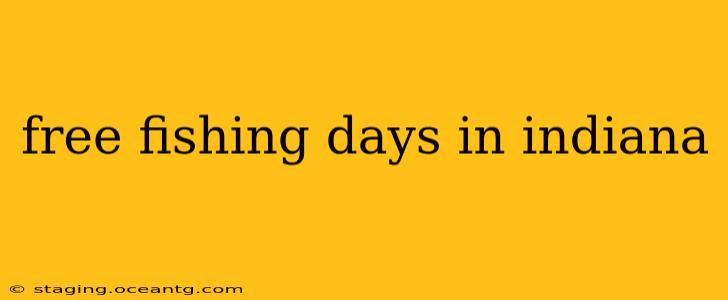Indiana offers fantastic fishing opportunities, and to encourage participation and appreciation for the sport, the state designates several free fishing days each year. These days allow residents and visitors to enjoy fishing without needing a license, making it an accessible and exciting way to experience Indiana's diverse waters. This guide will cover everything you need to know about free fishing days in Indiana, helping you plan your next angling adventure.
What are Indiana's Free Fishing Days?
Indiana's free fishing days are specific dates throughout the year when you can fish legally in Indiana waters without purchasing a fishing license. The dates are typically announced annually by the Indiana Department of Natural Resources (DNR), so it's essential to check their official website for the most up-to-date information. These dates usually fall on popular holidays or weekends, providing ample opportunity for families and individuals to get involved.
What does "Free Fishing Day" mean exactly? Do I need any other permits?
While a fishing license isn't required on free fishing days, it's crucial to remember that all other fishing regulations still apply. This includes adhering to size and bag limits for specific species, respecting catch-and-release guidelines where applicable, and ensuring you have the proper equipment and permits if you're fishing in specific areas like state parks or private waters.
Are there any restrictions on where I can fish on free fishing days?
Generally, no. Free fishing days apply to most public waters in Indiana. However, it’s crucial to be aware of any specific regulations for individual bodies of water or particular types of fishing (like bowfishing or spearfishing). Always check local regulations before heading out. For instance, some state parks may have additional permits or entry fees, even on free fishing days.
What if I want to fish on days other than free fishing days? Where can I get a license?
If you plan to fish in Indiana beyond the designated free fishing days, you'll need a valid Indiana fishing license. These licenses can be purchased online through the Indiana DNR website, at various retail locations across the state, or through authorized vendors. The DNR website provides detailed information about license types, fees, and how to obtain them.
What kind of fish can I expect to catch in Indiana?
Indiana boasts a diverse range of fish species, making it a fantastic destination for anglers of all skill levels. Some of the popular game fish include:
- Largemouth Bass: A favorite among bass anglers, providing exciting fights and opportunities for trophy catches.
- Bluegill: A panfish perfect for beginners and families, known for its abundance and delicious taste.
- Channel Catfish: A popular target for many anglers, known for their strong fights and impressive size.
- Northern Pike: A thrilling game fish prized for its aggressive nature and size.
- Walleye: A highly sought-after game fish known for its excellent flavor and sporting qualities.
This list only scratches the surface of the many species found in Indiana waters. The type of fish you can expect to catch will vary based on the location and time of year.
What are some good spots to fish in Indiana?
Indiana offers countless fishing spots, from quiet lakes and ponds to flowing rivers and bustling reservoirs. Researching specific locations based on your desired species and skill level is recommended. The Indiana DNR website offers resources and maps highlighting various fishing locations and their characteristics.
Do I need any special equipment for fishing in Indiana?
The necessary equipment depends on the type of fishing you plan to do and the species you're targeting. Generally, you'll need a fishing rod and reel, appropriate tackle (hooks, line, weights, lures, or bait), and a way to carry your catch. Consult with local experts or fishing guides for advice on what gear is suitable for different locations and fish species.
By understanding Indiana's free fishing days and preparing properly, you can enjoy a fantastic fishing experience in the Hoosier State. Remember to always follow fishing regulations and practice responsible angling techniques to ensure the sustainability of these precious resources for future generations. Happy fishing!
